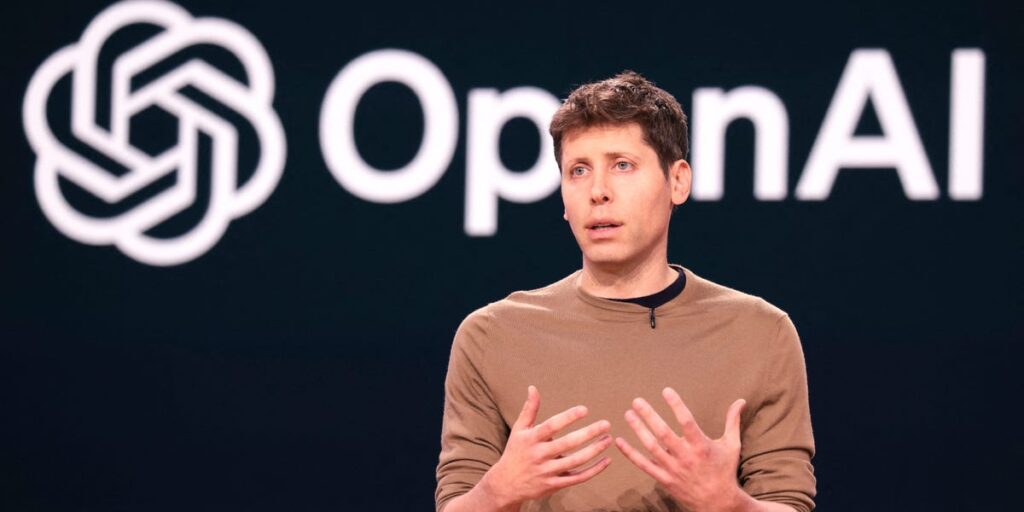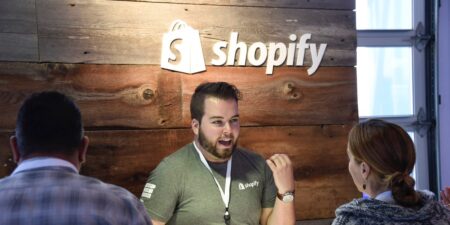- OpenAI’s ChatGPT once gave it a moat that protected it from competition from rivals.
- That moat is looking less secure as the likes of Chinese startup DeepSeek close the gap.
- OpenAI now seems ready to build a new moat with a $500 billion infrastructure project called Stargate.
OpenAI has a new $500 billion project called Stargate. Consider it an extraordinary attempt by the ChatGPT maker to build itself a whole new moat in the face of growing competition from rivals at home and a buzzy startup in China.
This week, OpenAI revealed plans to shift focus and spend $500 billion on AI infrastructure over the next four years. Stargate will focus on hardware powering advanced AI software, such as data centers and energy supply — all with Donald Trump’s blessing.
It is a colossal amount of money, but OpenAI has two critical reasons for spearheading the initiative alongside key partners SoftBank, Microsoft, and Oracle.
First, reaching what OpenAI boss Sam Altman calls an era of “superintelligence” depends on having access to more computing power. The industry insists that AI models will get smarter when given more of it, making ownership and access a priority.
Stargate, then, offers OpenAI a chance to build itself the kind of formidable “moat” that Warren Buffett once said companies need to ensure they maintain a competitive advantage against rivals. A vast infrastructure empire belonging to OpenAI would certainly help give it that.
The second reason for betting big on infrastructure through Stargate is even more critical: OpenAI may have no choice but to build itself a new moat in response to a Chinese startup that this week caused a stir in Silicon Valley.
Why OpenAI may need a new moat
When OpenAI first introduced ChatGPT to the world, it was clear that the combination of a powerful AI model and an intuitive, consumer-friendly interface gave it a moat that was the envy of Silicon Valley.
How much of a moat ChatGPT offers OpenAI has come under increasing debate.
The latest challenge to OpenAI’s moat came on Monday as a little-known Chinese startup called DeepSeek stunned America’s top AI researchers after revealing a new AI model called R1. In a paper, it said R1 rivals the frontier AI model OpenAI introduced just four months ago, o1.
Like o1, it reasons, meaning it thinks carefully before responding. According to DeepSeek, which has obtained an MIT license to open-source its model, R1 achieves “performance comparable to OpenAI o1 across math, code, and reasoning tasks.”
That an open-source Chinese company has been able to release a free model competitive with the best OpenAI has to offer has not gone unnoticed among AI’s most prolific leaders.
Jonathan Ross, the CEO and founder of Groq, an Nvidia rival backed by BlackRock and Samsung, responded to a question in Davos this week about DeepSeek’s latest release by claiming “open models will win.”
“We cannot do closed models anymore and be competitive — open always wins,” the former Google engineer said while noting that it will be harder to differentiate between models soon. As he put it, “The models are not going to be particularly special for long.”
Gary Marcus, a cognitive scientist and AI researcher, told Business Insider that he has been adamant for a year now that “closed source players have almost no obvious moat” and that it is”certainly even more true now” following DeepSeek’s release.
It’s not the first time OpenAI’s moat has been challenged.
In May 2023, when Google was busy playing catch up to ChatGPT, an internal memo written by an engineer inside the search giant, published by research firm SemiAnalysis, warned that “we have no moat, and neither does OpenAI.”
Why? Because, in the engineer’s view, the gap in capabilities between the models being worked on in Silicon Valley versus the open-source community was “closing astonishingly quickly.”
We are, of course, almost two years on from the warning issued in that memo, and OpenAI has since then convinced investors that it is of market-leading value, having completed a $6.6 billion funding round at a $157 billion valuation in October.
Nathan Benaich, founder and general partner of AI-focused venture capital firm Air Street Capital, offered Business Insider one explanation for why OpenAI has retained favor, noting ChatGPT has things like ease of use and reliability that make it a top pick for customers.
“OpenAI, I think, has won the spot of being CocaCola for consumers,” he said. “Who is the Pepsi? The gap is large.”
Avijit Ghosh, an applied policy researcher at Hugging Face, doubled down on the point, telling Business Insider that while DeepSeek’s R1 performance “challenges conventional wisdom about technical moats in frontier AI,” he thinks the reality is more nuanced.
“The real differentiation isn’t in raw model performance anymore — it’s in how these capabilities are integrated into practical applications and systems, and tech behemoths are still leagues ahead in being able to vertically integrate and commodify their models into products,” he said.
OpenAI offered a demonstration of this on Thursday following the release of Operator — an AI agent that serves as an assistant capable of booking everything from dinner reservations to travel.
This is clearly impressive, but resting competitive advantage on AI agents and an easy-to-use interface may still not be enough in the face of an entire industry making “agentic AI” its focus. The AI industry’s pace of innovation is relentless.
Building the Stargate moat
Stargate offers OpenAI a chance to build a new moat that could well be tougher to replicate than a large language model or AI agent for a few reasons. For one, having more computing power is vital to scaling models to greater levels of intelligence, experts say.
Dylan Patel, founder of research firm SemiAnalysis, told Business Insider: “Stargate is extremely important for OpenAI to be competitive because the access to compute is what enables them to keep scaling.”
Groq’s Ross, meanwhile, told a panel in Davos that he sees access to infrastructure being so important in the future that “what countries are going to be tussling over is how much compute they have access to.”
If OpenAI does manage to get Stargate built, it seems it will do so to serve its own purposes. A report from the Financial Times this week said Stargate will exclusively serve OpenAI — a sign that the project is meant to give the company an edge.
OpenAI did not respond to multiple requests for comment from Business Insider.
Clearly, then, the Stargate announcement suggests OpenAI sees a chance to build a new moat. It just can’t be expected to come easy.
Futurum Group CEO Daniel Newman noted that while the project is likely to work as a VC play, where the outcome is expected to be delivered at an unknown date in the future after serious investment, “raising $500 billion is going to be a real challenge.”
OpenAI remains lossmaking, and its key Stargate partners, like SoftBank and Oracle, the main equity funders alongside the UAE’s MGX, have cash on hand that falls far short of the $100 billion initially being deployed. From a sheer capital position, a new moat won’t be cheap.
Building the data centers and clean energy sources forming this new moat will require nationwide coordination spanning multiple initial technology partners, including Microsoft, Nvidia, Oracle, OpenAI, and Arm. Construction of a data center site in Texas is underway, but the project will need to go much further.
Hugging Face’s Ghosh also thinks the “‘compute is everything’ narrative misses the mark,” as small teams like Deepseek have shown “remarkable results through clever engineering.”
Still, OpenAI seems ready to go all in on Stargate to build a new moat. Its future leadership in the industry may well depend on its success.
Read the full article here
















